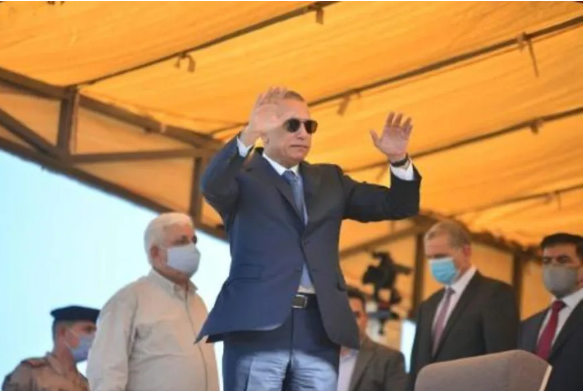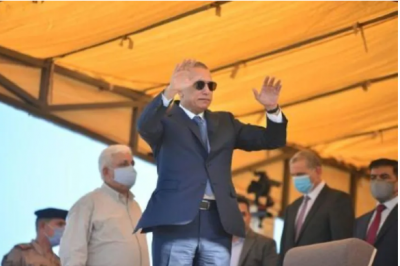Iraqi Prime Minister Mustafa al-Kadhimi is heading to Washington on Monday amid internal pressures and a fragile security situation, hoping to obtain an official announcement regarding a timeline for the withdrawal of American forces from the country. This demand is a primary concern for Iranian-aligned Iraqis and is expected to provide him with political momentum three months ahead of early parliamentary elections.
The visit comes after a suicide bombing in Baghdad earlier this week that resulted in 30 fatalities and was claimed by ISIS. Meanwhile, the U.S. continues to assert that the core mission of American forces in Iraq remains the ongoing defeat of ISIS, as stated by U.S. State Department spokesperson Ned Price. Officially, ISIS was defeated in Iraq in 2017 by Iraqi forces supported by an international coalition led by the U.S., but fears of its resurgence persist, according to a U.S. diplomatic source, as "many of the factors that led to the organization's rise in 2014 are still in place."
Researcher Sajad Jiyad from the Century Foundation told AFP that failing to reach a concrete announcement for a full withdrawal could lead to "Iran-aligned groups escalating tensions and intensifying their attacks on U.S. forces in the country." Recently, factions have intensified their pressures on al-Kadhimi, whose position has weakened due to increasingly complex crises in the country, particularly in living conditions and the economy, especially the electricity crisis, for which Iraq relies on Iran to meet demand, particularly during the hot summer months.
Qais al-Khazali, the secretary-general of the Asa'ib Ahl al-Haq movement, part of the Iran-aligned Popular Mobilization Forces integrated within Iraqi forces, pledged in remarks prior to al-Kadhimi's visit that "resistance operations will continue until all U.S. military forces exit from all Iraqi territory."
Since al-Kadhimi's last visit to Washington in August 2020, developments have unfolded, including ongoing attacks attributed to Iran-aligned factions against U.S. interests in the country, utilizing not only rockets but also precision drone technology that raises significant concerns for the international coalition. These attacks number around fifty since the beginning of the year.
From Washington, Iraqi Foreign Minister Fouad Hussein, who arrived a few days earlier to prepare for the visit, confirmed that discussions will indeed result in a timeline being established. However, U.S. media suggested that the withdrawal will effectively be a redefinition of the roles of the approximately 2,500 U.S. troops stationed in Iraq, who are officially not combat troops but rather "advisers" and "trainers," by the end of the year.
Ramzi Mardini, a researcher at the Pearson Institute at the University of Chicago, explained that "changes to the U.S. presence in Iraq" will not be radical but will "mainly aim to bolster the political interests of the Prime Minister" as the early elections approach. He added that the status quo will remain unchanged, meaning continued U.S. presence on the ground.
While internal pressures and deteriorating economic and social conditions weaken his position, "the Prime Minister's visit remains closely tied to his campaign for the elections scheduled on October 10," as he particularly seeks to "garner international and regional support," according to Mardini. This stems from his lack of "a political party and a popular base." As a result, "the only path for him to gain support for forming a government is through reconciling the political parties dominated by regional and international forces."
Mardini suggests that al-Kadhimi "is trying to leverage external support to compensate for his weak political position domestically." He needs "U.S. assistance to ensure that tensions do not escalate from their side and to see whether Washington will allow Iraq to engage in exchanges with Iran more easily," without Baghdad being subject to secondary sanctions affecting countries that trade with Tehran.
Jiyad mentioned that this would spare Iraq from descending into darkness as it did in June when Tehran cut off gas supplies, and "it gives al-Kadhimi the necessary leverage to remain Prime Minister." Amid all this, what al-Kadhimi most needs is to "overcome the summer crises and avoid deterioration," in a country plagued by corruption, crumbling infrastructure, and ongoing electricity cuts after decades of crises and wars. However, achieving this partial victory remains uncertain.
Mardini stated that despite Iraqis "desperately needing economic cooperation to be the cornerstone of relations with the U.S.," U.S. interests remain confined to addressing regional threats arising from terrorism and Iran, with which the U.S. is engaged in an indirect confrontation on Iraqi territory. The situation is likely to remain that way in the foreseeable future.




